Transforming Trauma into Teaching: Young Mother and Former Patient Becomes Field Educator
Categorized as: Africa, Education, Girls & women, Grantee, Leadership, Our Partners, Poverty Alleviation, Stories & Tagged as: Domestic violence, Empowerment, Gardens for Health International, Gender issues, Naomi Musabyimana, Nutrition, Rwanda on October 4, 2014.
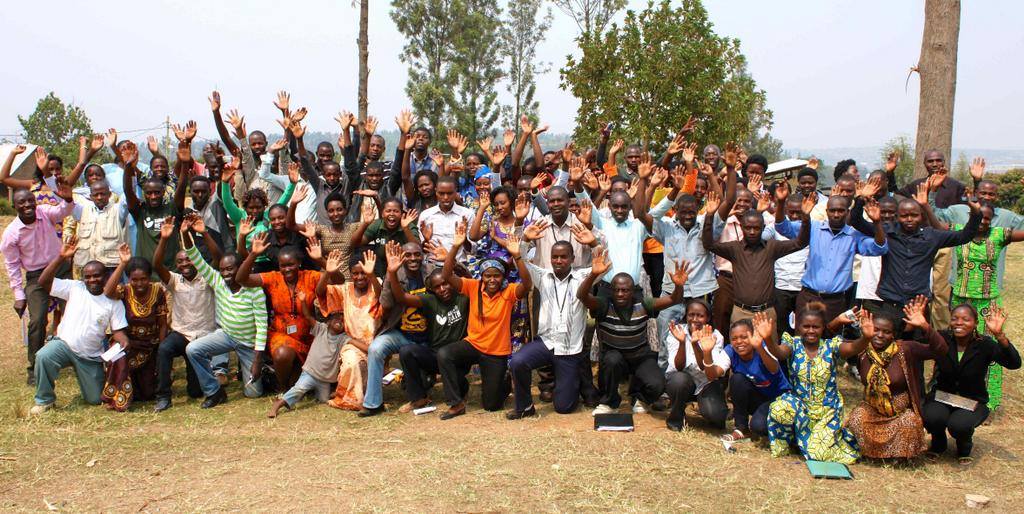
Editor’s note: When Gardens for Health International launched their first garden/nutrition training program for parents of malnourished children in 2011, they began with 122 families. This year, they’re serving 2,160 families in 18 health centers across Rwanda.
29-year-old Naomi, who’s been on both sides of the program as a former patient and a current teacher, shares her story of pulling herself up out of illness, depression, abuse, and hopelessness—into a life of leadership and strength. An HIV+ single mom who models hope for the mothers she now teaches, Naomi shares her journey below on how she became a role model in her rural community, and a leader in the fight to end poverty.
 By Naomi Musabyimana for Gardens for Health International
By Naomi Musabyimana for Gardens for Health International ![]()
As in most Rwandan families, my father and mother were farmers. My mother, she used to grow all kinds of food to make sure that we would not be in a food shortage: casaba, sweet potatoes, soybeans, sorghum, and other vegetables such as eggplants, tomatoes, cabbage, and green beans.
My Dreams for the Future
When I was a little girl, my family lived near a health center, and I would always watch the nurses passing in front of our house. Sometimes they even stopped by my house to say hello. I wished that I could also be a nurse.
While my mother was alive, she taught us to do all kinds of jobs. I had to stop my education at P6. I was fifteen years old when my mother passed away. I did not pass the national exams that children take at the end of the primary level. Because I had failed the exam and my mother was no longer alive, I had no one to take the responsibility of paying my school fees in a private secondary school.
Rough Road to a Marriage That Wasn’t a Happy One
I met a man shortly after my mother’s death. He proposed to help me, but then he raped me, and I became pregnant with my first baby. When I told him [that I was pregnant], he escaped the country. So, I had to stay with my father and stepmother, and he came back in the country when my first child, Angel,was three years old. He apologized and promised that he would marry me. I said yes. Then we moved and I became pregnant with my second baby.
When I was pregnant with my second baby I went for prenatal care at the health care center; they told me I was HIV positive. I knew that he was the one that had infected me, and when I told him, he didn’t seem surprised. He knew that he was infected, and he never told me. But I tolerated that because we had two children together. He was always beating me. We argued, and he was always insulting me, always screaming at me.
Slowly, I fell into a very serious depression. I was taking antiretroviral medicine—that’s what they give to people who are infected with HIV. But because of the depression, I forgot to take my pills. I went two weeks without taking my pills, and I knew that if I continued to do so, I would die, and I didn’t know who would take care of my babies. When my second baby was three years old, I separated from my husband.
I Decided to Put My Children—and Me—First
Apart from working in two different farms in my neighborhood, I didn’t have any formal job. Generally, I was helping farmers that hired me to sow beans, but also sometimes for weeding. I got a wage of 1,100 francs [$1.60 USD] per day.
Then I heard that there was a new program that came into our village. I went to the Gardens for Health farm and asked for a job. I have worked here now for four years, serving as a health educator. I have had different promotions. When they finally believed I would be able to help train other mothers who were in similar situations as I had been, I was then promoted to lead trainer, teaching trainers of families whose children suffer from malnutrition.
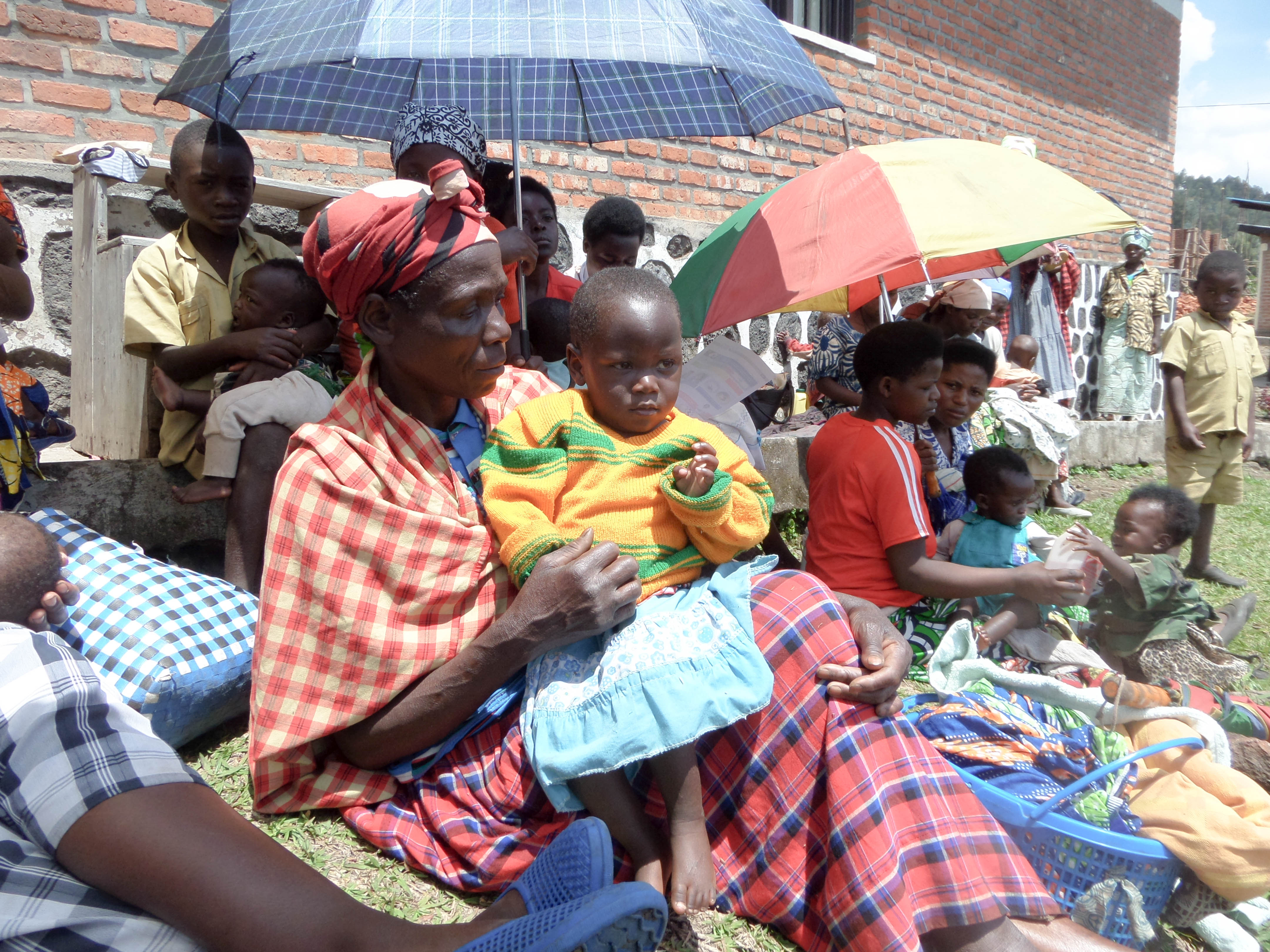 Gardens for Health moms gather to learn how to grow, and cook, nutritious meals for their families and themselves.
Gardens for Health moms gather to learn how to grow, and cook, nutritious meals for their families and themselves.
I start my job at 8:00 a.m. and I generally finish by 5:00 p.m., though sometimes I also go beyond this time. The work that I do on a daily basis depends on the schedule. Sometimes we do trainings, and other times we do home visits or cooking demonstrations with the families.
We work with eight health centers. We enroll 40 mothers at each health center for one agricultural season. In total, we enroll 120 families per year. In the field, we split ourselves into teams for supervision. I’m in charge of the mothers in three health centers; it requires a lot of teamwork with my colleagues. I’m also in charge of other health centers. They give me a certain numbers of mothers that I follow for 3.5 months, the time for which we have the mothers enrolled in our program.
What I Enjoy Most About This Job
The part that I enjoy the most in my work is the home visits where we visit the families that we work with in their household. I have enough time to discuss things with the mothers, and we are in a very quiet place to discuss the problems that they’re facing. Most of the time, I share with them my story, and I tell them what I went through and how I was able to overcome most of the problems that I was facing.
“It helps them a lot, because discussion is sometimes what the mothers need.”
It helps them a lot, because discussion is sometimes exactly what the mothers need. Some are deeply depressed. When they discuss they feel believed, but also they understand that I have faced many of the same challenges that they have. I try to give them the strength or the courage to continue in life by knowing there are people who have been in worse situations than they are today.
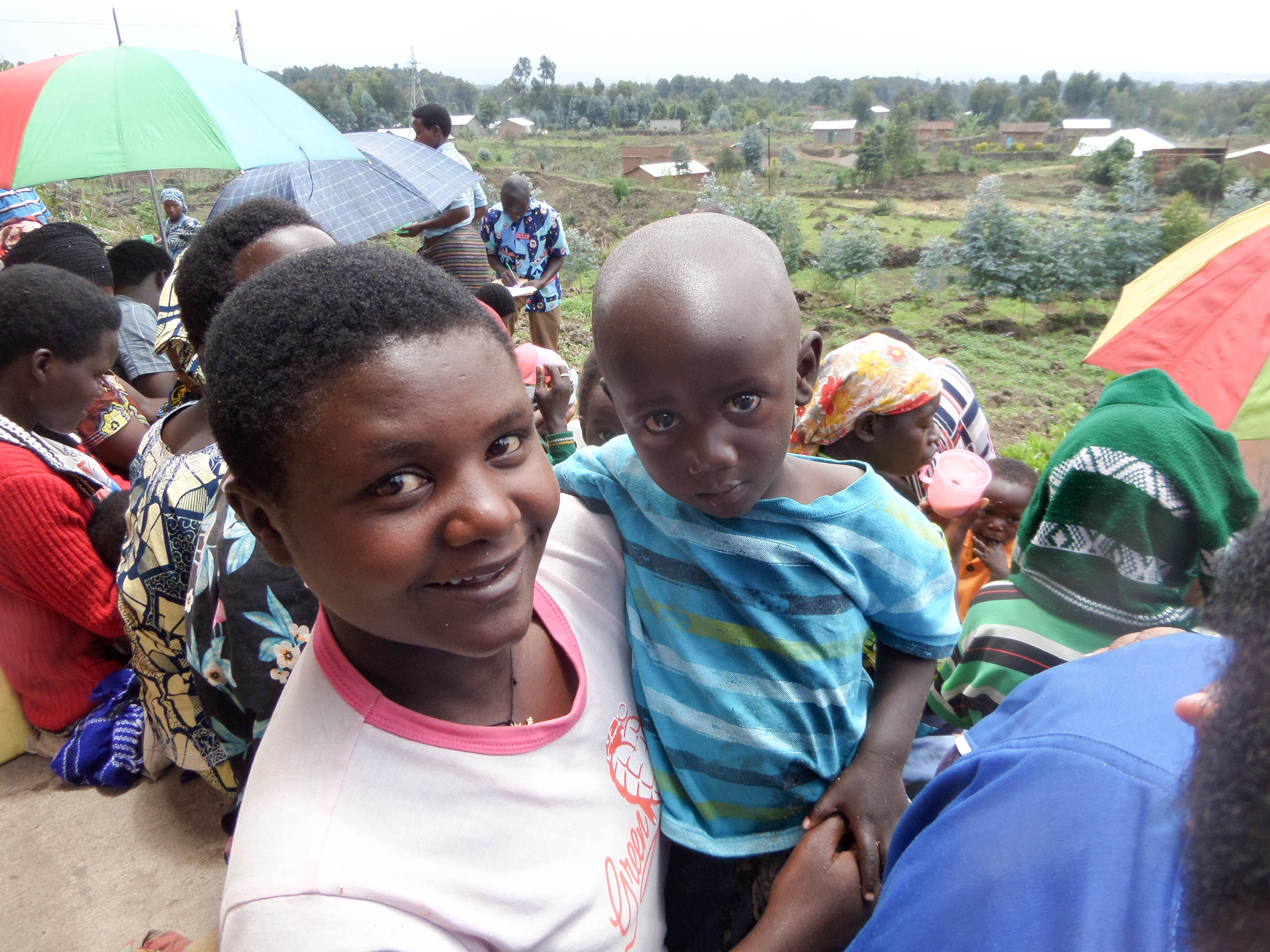 Young mom proudly shows that her son is now in thriving health.
Young mom proudly shows that her son is now in thriving health.
When I see the mothers that we train and that we help, it’s like I’m facing my life in the mirror. The past that I have been through, it’s the same past that these mothers are facing, and it helps that I understand them and can provide them with adequate assistance.
I remember one mother named Rosinne. Her husband had passed away, and she was HIV positive, too. She had stopped taking her pills. When I asked her if she had her own house, she said yes. When I have asked her if she had friends and family to support her, she also said yes.
I told her there are mothers who don’t have their own house and don’t have any family support. I shared with her my own story. At that time, I didn’t have a house, and I told her, “Me, too, I am HIV positive. I don’t have anyone to support me and my family, but, as you see me, you can’t even [tell] that I’m HIV positive.” She was surprised.
She said, “Oh, Teacher. Even you, you have HIV. I didn’t know, and you are the one to come to teach us, and you even don’t have a house.”
And from that day, she said, “I’m going to start loving my life. I’m going to start loving and taking care of my babies, and I’m going to start again taking my pills.”
The Hunger in Their Eyes Haunts Me
The most challenging part of my work is that we work with very, very poor families. Sometimes, when we are doing home visits, the mothers tell us that they didn’t have food to cook for their children, don’t have access to food every night. When I know that I don’t have something to give them that they can cook for that night, it makes me feel bad to see these children looking at me with hungry eyes that I can’t satisfy.
“It makes me feel bad to see these children looking at me with hungry eyes that I can’t satisfy.”
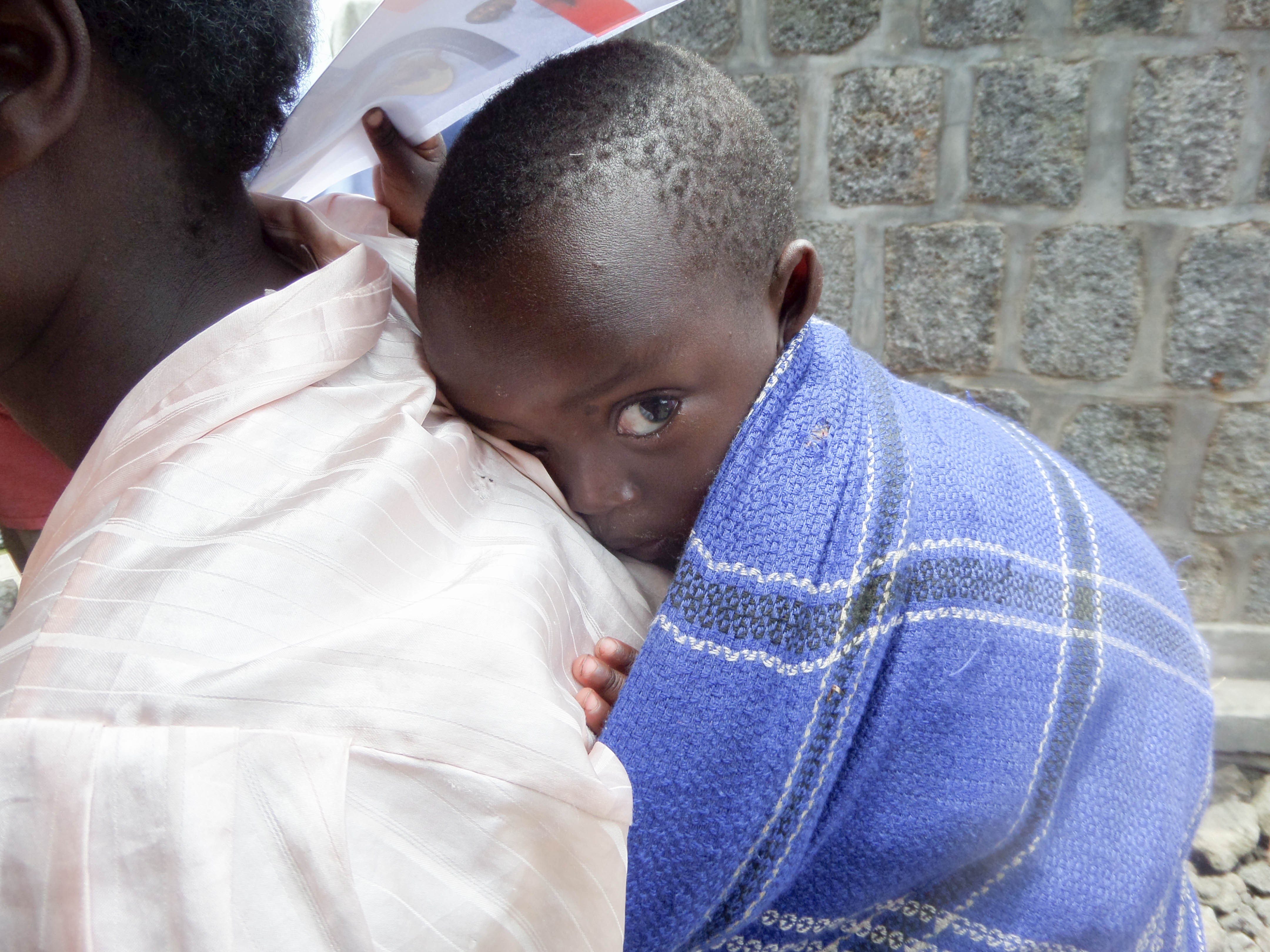 Naomi wants little ones like this everywhere to be well-fed and cherished.
Naomi wants little ones like this everywhere to be well-fed and cherished.
Sometimes I think about a short-term solution, like giving them food or a small amount of money so they can eat that night. When I think about a long-term solution, I wish that I could give to their mothers an opportunity to generate income so that they can consistently have access to food so that their children can overcome this problem of hunger.
At Gardens for Health, we show mothers how to build their capacity and work with their limited resources. If I had the means to change the community, I think I would establish a program to provide small jobs for families. I would focus on jobs that are available in Rwanda, especially in the rural areas, selling items such as tomatoes, small dried fish, and vegetables, so the mothers can generate some money that can help them to be able to raise their families in a better way.
My Life Turned Out To Be Happy, After All
It’s really difficult to describe, but all that I can say is that I’m happy now. I have three sisters and two brothers. Now I live alone with my own children. Cedric is my third child, my adopted son. His mother had a mental illness, and when she gave birth to him, she was not mentally able to raise him. When Cedric was three months old, he weighed only 2.1 kilograms [4.6 pounds]. The GHI team asked whether I would like to take care of him. They gave me materials and food to help raise him.
I now have my own house. It’s not like these houses that we see in the U.S. After I got my job and my contract, I was able to go to the bank and ask for a small loan. I also received help from my friends. I have been able to build a house with three bedrooms and a living room. My biggest dream is to be able to buy a big piece of land and to build a big house. I know that’s difficult in my current situation because I live on a very small plot— I can’t even build a fence around my house. I wish that I could build my dream house where I would not be sharing my bedroom with my cooking pots and other materials used in the house.
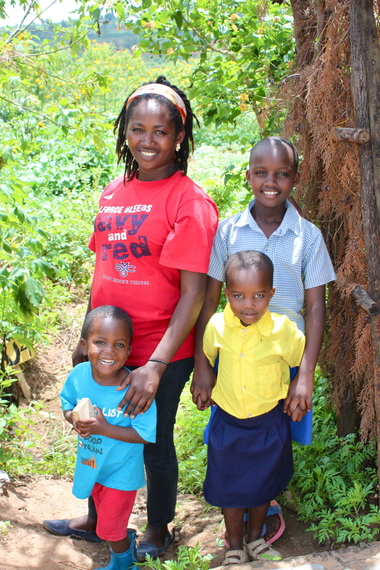 Naomi, with her three children, in the happy life she built with her own resilience and courage.
Naomi, with her three children, in the happy life she built with her own resilience and courage.
I’m not able to save money because I’m a single mother covering all the expenses and taking care of my three children, and I’m also paying off the home loan. It’s really difficult to describe, but all that I can say is that I’m happy now, especially because I don’t have someone who is always torturing my spirit. I’m going to make good decisions for my future and the future of my children.
Even Though I Know Better, We Sometimes Lack Nourishing Meals and Even Shoes
I’m not able to save money because I’m the one taking care of my three children and paying the loan that I took from the bank to build my house, 110,000 Rwandan francs [$160 USD] per month. Although I am trained in nutrition and I know the importance of balanced meals, sometimes I don’t feed my children properly because I don’t have a choice. If I had enough money, I’d make sure that my children had a balanced meal every day. I’d also make sure that I had shoes and clothes to put on them.
If I had a lot of money, I would make sure that my children would not miss anything that they would like to have. I wish I could save money so that they could have access to a quality education, because this is the best heritage that we can give to our children in Rwanda.
I Have a Lot in Common with My Students
What we share, my mamas and I, it’s about how we want to achieve the same objective: overcoming the problem of malnutrition.
When you are HIV positive, it’s not always easy to think that you have access to the same dreams as other people. However, for me, I am a decision maker. I like to make tough decisions. I made the decision to separate from my partner, and I put it into practice. Another thing I discovered about me is that I like to take care of myself. I know that the more I take care of myself, the better I will live. And this is advice that I can give to other people, especially to people who are facing illness in their life, such as HIV.
Globally, there so many malnourished children that they could form a circle around the Earth; in Rwanda, 44% of children are malnourished.
Photos courtesy of Gardens for Health International.
LEARN more about Gardens for Health International’s holistic healthcare approach to ending malnourishment through peer-led education and kitchen-garden inputs, here.
DONATE directly to provide more trainings and seedlings for hungry families in Rwanda, here.
SHARE this story on Facebook and Twitter; see menu at top and bottom of page.
SUBSCRIBE! Like what you see? Click here to subscribe to Seeds of Hope!
